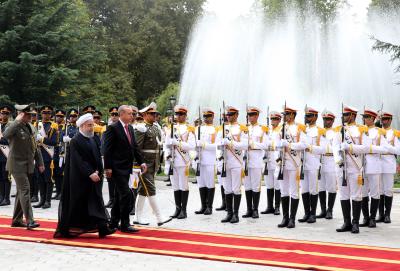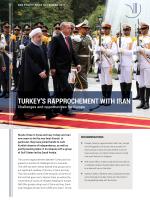Turkey's rapprochement with Iran

Rivals of late in Syria and Iraq, Turkey and Iran now seem to be the new best friends. In particular, they have joined hands to curb Kurdish dreams of independence, as well as jointly backing Qatar in its dispute with a group of Gulf States led by Saudi Arabia.
■ With some effort, Turkey could still be recruited as a mediator between Saudi Arabia and Israel on the one side and Iran on the other.
■ Asking Turkey to fill these roles could grant Europe some leverage to nudge Turkey and Iran back to the negotiating table with the Kurds.
The current rapprochement between Turkey and Iran presents a number of challenges for EU countries. This shift has seen Iranian-backed Shia groups carve out significant swathes of territory in Syria and Iraq. This risks another round of the exclusion of Sunnis of the kind that gave rise to Islamic State, as well as the movements of scores of refugees heading for Europe. With Shia groups ruling most of Syria and Iraq, Sunni Arab refugees will also find it difficult to return. On the regional level, Turkey as a NATO member could come to side not only with Russia, but also with Iran in the ever more salient conflicts between, on the one side, the odd bedfellows Israel and Saudi Arabia, and, on the other, Iran. As a response to US threats to cut off the planned delivery to Turkey of 116 F-35 fighter jets, pro-government pundits in Turkey have warned that the country would stop hosting the X-band radar and early warning system that is key to NATO’s missile defence program against Iran. All in all, not an easy problem for European actors to shoulder.
However, the Turkish U-turn contains a number of opportunities that, handled correctly, could grant European countries more leverage to address those challenges. First, Turkey could be a helpful partner in furthering European interests in supporting the thaw with Iran, a thaw that is now hanging in the balance in the US Congress. Secondly, Europe could support Turkey in its possible role as a mediator in the dawning Saudi-Iranian and Israeli-Iranian conflicts. Thirdly, the rapprochement between the two countries has the potential to dampen the usually highly conflictual Sunni-Shia polarization of the region.
If we assume that Europe is interested in avoiding a complete fall-out with Turkey, ensuring a lasting stability in the war-torn region, nipping in the bud the emergence of an ISIL 2.0, making it possible for Syrian and Iraqi refugees to return safely, and avoiding another round of repression of the Kurds, understanding what drives Turkey’s seemingly puzzling U-turns on Iran can prove helpful. This is especially the case if Europe wants to avoid having to reengage in the region, now that preoccupation with Russia again is in the ascendant.
Turkey could be a helpful partner to further European interests in supporting the thaw
with Iran
Turkey’s three turnabouts on Iran under the AKP
A first step in gaining an understanding of some of the underlying motives that are driving Turkey in relation to Iran is to grasp why Turkey has made no less than three U-turns on Iran since the advent of the AKP government in 2002. First, the AKP government has dropped the traditional Kemalist animosity towards Iran and cautiously engaged in a rapprochement with Tehran, culminating in Turkish support for Iran against the US at the UN Security Council in 2010. This was motivated by Turkey’s ‘zero problems with neighbours’ doctrine and a pan-Islamist outreach to all Islamic regimes in the region that guided the early phases of the AKP foreign policy. In 2011, however, Turkey made a second U-turn on Iran and surprisingly agreed to host the X-band radar and early warning system against Iran under NATO’s missile defence program. This probably happened in response to Iranian support for the two main opponents of the Sunni popular insurgency groups that Turkey was now supporting pro-actively in the emerging Syrian conflict, namely the Alawite-Shiite Assad regime in Damascus, and the Kurdish PYD/YPG group in northern Syria. The summer and fall of 2017 witnessed the third Turkish U-turn on Iran. Already engaged in the Syrian peace talks in Astana, Turkey warmed to Iran because of the opposition of both to Kurdish hopes of independence. They also expressed joint support of Qatar, a long-time supporter, like the AKP government, of the Muslim Brotherhood and host to one of the few Turkish military bases in the region.
A first step in gaining an understanding of some of the underlying motives driving Turkey on Iran is to understand why Turkey has made no less than three U-turns on Iran since the advent of the AKP government in 2002.
From strategic depth to strategic flexibility
Since the 1980 and 1990s, Turkey has developed an open and growing economy with an increasing need for trade and energy imports. Indeed, Turkey has experienced the steepest growth in energy demand in the OECD over the last fifteen years and imports 74% of its energy requirements. Trade was thus a strong driver of the AKP’s initial turn towards Iran. Since then it has been compartmentalized to apparently stay on track through a so-called ‘oil-for-gold’ program during the years of international sanctions on Iran and the differences between Turkey and Iran over ideology and the projection of influence in Iraq and Syria. The most recent rapprochement also came with the signing of a host of new trade deals.
The fluctuations rest, rather, on a three-step drift in Turkey’s foreign policy outlook:
- First, the initially multilateral and pragmatic idea of ‘zero problems with neighbours’, driven by both economic concerns and joint Islamic identity, slowly countered domestic Kemalist criticism of Iran with increased NATO worries about the nuclear programme revealed in 2002.
- Secondly, the ideologically assertive ‘strategic depth’ on the side of Sunni populations against especially Shia autocrats in the region in 2011 reflected a cooling of relations with both the EU and the Obama administration in the US. It also reflected the fact that Erdoğan had broken most of the domestic power of the Kemalists and positioned himself to as a hero to the Arab Spring, especially through his open criticism of Israel.
- Thirdly, the AKP has of late turned to an increasingly unilateralist transactional pragmatism, or what might be called ‘strategic flexibility’. This reflects the near loss of domestic power in the June 2015 election, as well as Turkey’s regional and international isolation on Syria and Iraq and the increasing sense in Ankara that it is facing subversive conspiracies by its U.S., EU and NATO partners.
The newfound power-pragmatic nationalism
Strategic flexibility reflects Erdoğan and the AKP government’s ever narrower and inward-looking interest in the retention of domestic power. Towards this end, Erdoğan has co-opted the Turkish nationalism that has been fanned by the under-reporting of now about 3 million primarily Arab refugees in Turkey, as well as the regional and domestic success of the Kurdish cause and international support for it. Understanding the depth and ramifications of this newfound power-pragmatic nationalism is key when making the most of the opportunities and addressing the challenges that Ankara’s most recent turnabout on Iran has given rise to.
Making the most of the opportunities
Zooming out, Turkey and Europe still have a shared interest in establishing lasting stability in Iraq and Syria, as Islamic State has now been almost defeated as a territorial power. Arguably, Sunni exclusion was the key driver of the emergence of Islamic State and a key push-factor of refugee flows. Erdoğan’s domestic manoeuvring for power and his recent rapprochement with both Russia and Iran may have seen him cut some of his support for Sunni groups in Syria and accept the Shia-led regimes in Baghdad and Damascus. Nonetheless recognizing Turkey as a protector of Sunni Muslim groups and as a key actor in ensuring lasting stability in the region could prove helpful. Avoiding another round of Sunni exclusion is urgent, since the recent rapprochement between Turkey and Iran has seen Shia Muslim Iran win large swathes of territory and deep influence in both Iraq and Syria.
Secondly, Europe could appeal to Turkey as a partner and mediator at the state level between Saudi Arabia and Iran, as well as between Israel and Iran, in order to prevent these growing regional conflicts from escalating further. Turkey is not the best of friends with either Israel or Saudi Arabia. Nonetheless, fences have been mended with Israel following a 2010 falling out, and dialogue between Ankara and Riyadh is open despite a rift over Turkey’s and Qatar’s joint support for the Muslim Brotherhood. On this state level, Turkey could also be recruited as a welcome factor boosting Europe’s support for the thaw with Iran against US pressure.
Addressing the challenges
If these opportunities are carefully invoked, European stakeholders will gain some leverage with Turkey to address some of the harder challenges raised by Turkey in general and its rapprochement with Iran in particular.
On the level of non-state actors, a push could be made for a return to the negotiating table with the Kurds. This is a highly difficult diplomatic exercise, since Turkey accuses Europe of aiding and abetting the PKK. But it is necessary to dissolve the recalcitrant European dilemma of either having to stay in the region (with the US) to support the Kurds or to pull out and see another round of suppression of the Kurds that is also likely to produce violent returns.
On the state level, Europe could encourage Turkey to put pressure on Iran to abide by the details of the 2015 JCPOA nuclear deal and thereby add to the thaw between Iran and the West as well.
DIIS Experts



